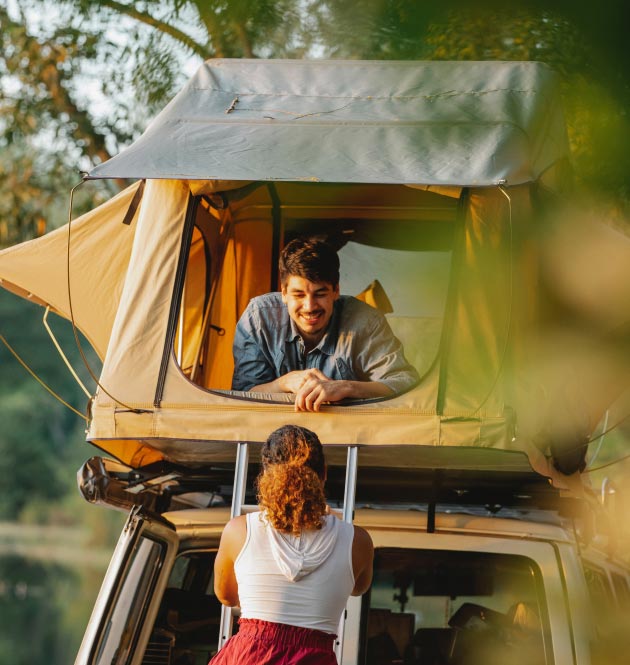FAQ Section
Explore our comprehensive FAQ section dedicated to glamping in the UK. Whether you’re new to glamping or a seasoned enthusiast, our FAQs provide clear, concise answers to your most common questions. From choosing the best glamping sites to understanding the legalities and what to pack, we cover it all. Our aim is to make your glamping experience as smooth and enjoyable as possible with expert information and personalized recommendations tailored to the UK’s unique landscape and offerings.
Tent Camping
Glamping tents are often referred to as safari tents, bell tents, yurts, tipis, or canvas tents, depending on their design and structure.
To turn your tent into a glamping experience, add comforts like an air mattress or cot, cozy bedding, rugs, string lights, and portable furniture. Create a relaxing ambiance with decor, and consider adding a small heater or fan for climate control.
Yes, you generally need planning permission to set up glamping tents, especially if they are permanent structures or if the site will be used for commercial purposes.
Many glamping tents come equipped with private or shared toilets, either inside the tent or in a nearby facility, offering greater comfort than traditional camping.
The cost of a glamping tent varies widely, ranging from around £1,000 for a basic setup to over £10,000 for luxury models with amenities.
Glamping is more expensive due to the luxury accommodations, exclusive locations, and additional amenities such as private bathrooms, electricity, and sometimes even gourmet services.
Family Campsites
There are many family-friendly campsites in the UK, such as Haven Holiday Parks, Forest Holidays, and Cool Camping sites that offer kid-friendly activities, playgrounds, and safe environments.
Campsite prices in the UK typically range from £10 to £30 per night for a basic pitch, though prices can increase depending on the location, facilities, and season.
Yes, camping is a great family holiday as it offers quality time together, outdoor activities, and an opportunity for children to learn about nature and develop new skills.
To get the best campsite, book early, especially during peak seasons, choose a site that suits your needs (e.g., near facilities or with specific amenities), and read reviews to ensure quality.
The best age to start camping with a child is around 2 to 3 years old when they can walk and communicate basic needs. However, many families successfully camp with younger infants as well. The key is to choose a family-friendly campsite and ensure you’re well-prepared with the right gear and supplies.
In the UK, wild camping is generally illegal without landowner permission, but it is permitted in parts of Scotland, particularly in the Scottish Highlands. In other areas, like Dartmoor National Park, it’s allowed in designated spots. Always check local regulations before camping.
Wild Camping
Wild camping is generally illegal in England, Wales, and Northern Ireland without the landowner’s permission. However, it’s allowed in certain areas of Scotland, particularly in the Scottish Highlands.
If you’re caught wild camping without permission, you may be asked to leave, and in some cases, you could face a fine or other legal consequences, depending on local regulations.
Wild camping refers to camping outside of designated campsites, usually in remote or natural areas, often without facilities.
Yes, wild camping is generally permitted in Scotland, especially in remote areas like the Scottish Highlands. It’s allowed under the Scottish Outdoor Access Code, which encourages campers to be responsible and leave no trace.
No, you cannot pitch a tent anywhere in the UK. In England, Wales, and Northern Ireland, you need landowner permission to camp outside designated sites. In Scotland, wild camping is allowed in most areas, with some restrictions.
Yes, it is legal to sleep in a roof tent in the UK, as long as you park in a legal and safe location where overnight stays are permitted, such as campsites or certain parking areas. Always check local regulations to ensure compliance.
Travel to Transform Your Emotions
FAQ Guide to Positive Change
Discover how travel can uplift your emotions and transform your outlook on life. Our FAQ information and recommendations website offers expert advice on destinations and experiences that promote emotional well-being. Whether you're seeking adventure, relaxation, or cultural enrichment, we provide the insights you need to choose the right journey for your emotional health. Explore our resources and start planning a trip that will change your life for the better.
Saticfied Clients

Subscribe Our Newsletter Get Every Update
GlampingPro.co.uk: Discover the best glamping destinations in the UK, combining comfort and nature for unforgettable stays.